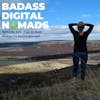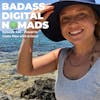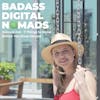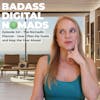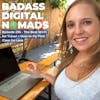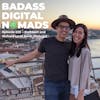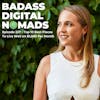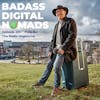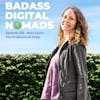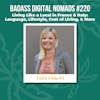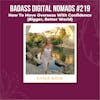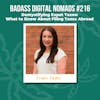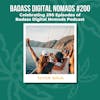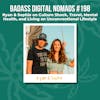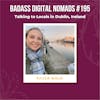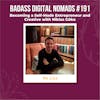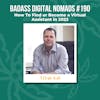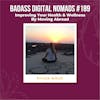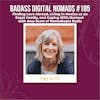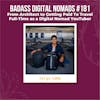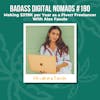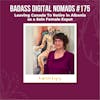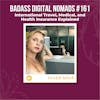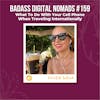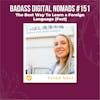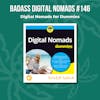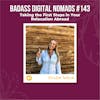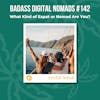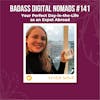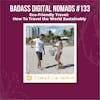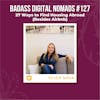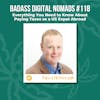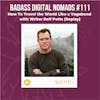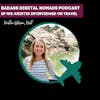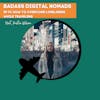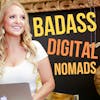From Blue Collar Worker to Becoming a Financially Free Digital Nomad
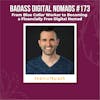
Kristin speaks with a self-made digital nomad who left his blue collar job in Canada to become a financially independent entrepreneur in Costa Rica. Learn how Andrew transitioned from working for the railroad and coast guard to becoming a nomadic/expat online business owner.
Kristin speaks with a self-made digital nomad who left his blue collar job in Canada to become a financially independent entrepreneur in Costa Rica. Learn how Andrew transitioned from working for the railroad and coast guard to becoming a nomadic/expat online business owner.
Contrary to popular belief, you don’t have to have a technical background or already have a remote job to become location independent. Andrew is a prime example of how possible it is to be a digital nomad and make an income online with little to no experience.
In this interview, Andrew gets raw and real about his darkest times in life and how becoming a digital nomad saved his life. Tune in now!
Episode 173 Special Offers:
- Apply for a call with Kristin to talk about your relocation.
- Get $100 off Andrew’s course “YouTube Marketing for Entrepreneurs & Businesses” with code KRISTIN.
Connect with Kristin:
- Follow on Instagram
- Subscribe to Traveling with Kristin on YouTube
- Subscribe to Digital Nomad TV on YouTube
- Join the Badass Digital Nomads Facebook Group
...........................................................................................
Support the Badass Digital Nomads Podcast:
- Buy Kristin a Coffee
- Become a Patron
- Leave a 5-Star Review
- Buy Official Merch
- www.badassdigitalnomads.com
...........................................................................................
A special thank you to Kristin's Patrons!
Become a Patron for $5/month at Patreon.com/travelingwithkristin
...........................................................................................
IN THIS EPISODE:
- How Andrew quit his blue collar jobs to work online.
- Andrew’s cost of living and daily life in Costa Rica.
- Tips for public transportation and navigation in Costa Rica.
- Getting health insurance in Costa Rica & The reality of healthcare in Canada.
- How to become a tax-free citizen of Canada & The benefits of being tax-free.
- Tips for reinventing yourself time and again, and how to pivot from physical work to entrepreneurship and the digital nomad lifestyle.
- How to make money online as a location independent traveler.
- Being a digital nomad during the peak of the covid-19 pandemic.
- Tips and strategies for developing new skill sets and finding flexible, remote jobs.
QUESTIONS ANSWERED:
- Do you have to learn the language to live in a foreign country?
- If you’re a tax-free citizen in Canada, can you still get Canadian healthcare?
- Do you have to close your Canadian bank accounts when you move abroad?
- What was your strategy for finding work after leaving the Coast Guard?
- How did you start your YouTube marketing company, YT Era?
- And more!
RESOURCES
Books & Articles Mentioned:
- Why Digital Nomads Are Coping Better With the Quarantine by Kristin Wilson
- Nomad Capitalist by Andrew Henderson
- The Compound Effect by Darren Hardy
- The Slight Edge by Jeff Olsen
- Can’t Hurt Me by David Goggins
- Built to Serve by Evan Carmichael
Related Podcasts:
- Coping with Coronavirus Quarantine - Why Digital Nomads are Better Prepared
- Leaving Corporate America To Become a Full-Time Traveling Family (World Towning Part 1)
- How To Find Your Home and Your Community Abroad (World Towning Part 2)
Related Videos:
- 8 Reasons Why Americans LEAVE Costa Rica [Why I Left]
- Costa Rica Cost of Living for Foreigners and Expats
- Best Places for Expats To Live in Costa Rica
- How to Become a Full-Time Digital Nomad
- Operation Mincemeat on Netflix
Recommended Resources for Digital Nomads:
- Andrew’s YouTube Service: YT Era
- Meal Delivery Service: Food Studio
- Legal Services in Costa Rica: Outlier
- Tax Consulting & Strategies: Wanderers Wealth, Nomad Capitalist
Other Resources Mentioned:
Connect with Andrew:
Podcast descriptions may contain affiliate links of products and services we use and recommend at no additional cost to you.
Ready To Relocate:
Kristin: 00:00:00 Do you have plans to move to a new country in the next year or so but feel bogged down and overwhelmed with all the details? Would it be helpful to you and give you peace of mind to be able to work with me over the course of three months to plan your relocation and check in with me on a weekly basis? Ask me questions and send me a direct message whenever the need arises. If that sounds like you then set up a call to talk with me at travelingwithkristin.com/apply. That's Traveling with Kristin; K R I S T I N.com / A P P L Y.
Introduction: Welcome to Badass Digital Nomads, where we're pushing the boundaries of remote work and travel, all while staying grounded with a little bit of old school philosophy, self-development, and business advice from our guests.
Kristin Wilson, Host: 00:01:06 Hey there, Kristin, from Traveling with Kristin here and welcome to episode 173 of Badass Digital Nomads. My guest today is Andrew Murdoch, who is a self-made digital nomad and entrepreneur from Vancouver, Canada. I was so excited to have Andrew on the show today to share with us how he transitioned from a slew of different blue collar jobs to becoming a location independent and financially independent digital nomad. Currently living in Costa Rica, there are a lot of misconceptions about becoming location independent, that you have to have a lot of tech skills, a technical background, or that you have to already have a job that you can do online. But Andrew is living proof that you can come from a physical job as a scuba instructor or a train conductor or a member of the Coast Guard or any other number of physical jobs and acquire the skills that you need rapidly to be able to make an income online.
Kristin: 00:02:15 In this interview, he gets really raw and really personal sharing about his deepest, darkest times in his adult life, uh, some of the things that he went through and how becoming a digital nomad saved him. Andrew gives a lot of tips and resources in this episode and as usual, we've linked to all of them, including books, Netflix shows, documentaries, and more. Over in the show notes and on badassdigital nomads.com, Andrew's also offering listeners of the show a discount on his course, which helps you start and monetize a YouTube channel and you can get the discount using the link in the the show notes and using the code: Kristin; K R I S T I N at checkout. So for all of you who have been thinking about starting a YouTube channel or you've started a channel but you haven't been able to get any momentum, this course is for you.
Kristin: 00:03:13 It's just a couple hundred bucks. It's a great deal and I wish I had access to a course like this four or five years ago and after we stopped recording the interview, he admitted to me that he doesn't like thinking about how his life would've turned out if he didn't become a digital nomad. And so I just felt that this was a really important conversation to share with you because it illustrates that no matter what has happened in your life in the past, your future is still yours for the taking and you can make small changes in your life and send it in a completely different and new trajectory. So if you've ever felt that you were in a dead end job or in a slump and just really couldn't see your way out of a hard situation, I think you'll find a lot of insights and tips and inspiration in today's conversation with Andrew Murdoch. Enjoy.
Podcast Interview:
Kristin: Well, welcome Andrew to Badass Digital Nomads podcast. Thanks for joining us today. And where are you based at the moment?
Andrew: 00:04:20 I knew you were gonna ask that, Kristin, I'm in your old stomping grounds. I'm actually coming to you from Costa Rica. I'm living in Uruca. I used to live more towards downtown but found a great apartment that I couldn't pass up and like many digital nomads, I spent most of my time working from home. So I decided to move out to Uruca and actually woke up this morning at five o'clock and did a 10K run around, uh, the Sabana Park, which I'm guessing you're probably familiar with too.
Kristin: 00:04:45 Yeah. Amazing. And how long have you been there?
Andrew: 00:04:49 I've been in Costa Rica since August of last year, so I'm coming up to my first year right now. I'm actually getting residency, gave up Canadian residency last year, getting Costa Rica residency this year.
Kristin: 00:04:58 Oh good. We'll have to talk about that. And are you by yourself right now or did I see that you have a family and a kid or was that a nephew?
Andrew: 00:05:08 That was probably my nephew. Oh, okay. I live with my girlfriend here. I have a Tica girlfriend, <laugh>.
Kristin: 00:05:12 Oh, okay. And did you meet there or did you meet somewhere else and then decide to move to Costa Rica together?
Andrew: 00:05:19 We met here. It's the same old story that I think everyone's probably heard a million times. I was only in Costa Rica for, I wanna say two or three days when I joined Tinder and then we matched right away and I was actually living up north in Tierra. I don't know if you spent any time in the La Fortuna area. I think you have. Yeah, I was living in Tierra. I was doing a house sit up there, actually I'm staying in a beautiful property with a pool and just had everything and we were doing the whole remote texting conversation for a few weeks before I can get my butt to the big city and now I live here. Yeah.
Kristin: 00:05:48 Wow. And how long ago did you meet?
Andrew: 00:05:50 We met, well we matched on Tinder right after I arrived, so in late August of last year. Okay. And we've been together ever since. Yeah.
Kristin: 00:05:58 Amazing. Yeah, I've heard a lot of stories that way. So love at First Sight or love at First Match, <laugh> <laugh> and your apartment in Uruca. Before we get into your backstory, what is your cost of living there and what is your rent price?
Andrew: 00:06:15 Yeah, so I'm a Vancouver boy. Spent most of my adult years in Vancouver, Canada, which is, I probably don't have to tell you or your audience, one of the most expensive real estate markets in the world. So I could go almost anywhere and racking huge savings. And so I'm living a two bedroom, two bath, paying a little over a thousand dollars a month including the maintenance condo fees. And then depending on the month, maybe another $150 for utilities.
Kristin: 00:06:43 Okay. Pretty good. And how are you finding the San Jose lifestyle? I know that you mentioned you ran around the park, which is, it's like their central park of New York. La Sabana is to San Jose as Central Park is to New York City. But what is your daily life like there?
Andrew: 00:06:59 Yeah, I tried to run once a week, became addicted to David Goggins a few years ago. I listened to his audiobook every January, Can't Hurt Me. I always hated running. I'm not a runner. I've always been a fan of hitting the gym, lifting weights, doing the typical things that most people talk about and then listening to his audiobook every January definitely lit a fire under me. And I uh, made the mistake of doing a 10K run this morning on some brand new shoes that I haven't broken in yet. So yeah, I'm hurting right now. But <laugh>, I tried to do a big run, a 10K run once a week, which is probably big for some, not big for others. And then I always choose Airbnbs or apartments I'm in a lease right now that have a gym built within the building because I'm not one of those people that likes to have to hunt.
Andrew: 00:07:41 Like I've been a digital nomad since 2018 and I learned a long time ago that when I'm relocating to a new location, I don't wanna waste time having to find a gym to get my fitness in. And I arguably think that fitness is just as important if not more important for digital nomads, especially in my situation. I sit for a living and I can tell when my body is starting to fight me, things just get rigid and stiff and when the blood's not pumping and then I become less creative, which is super important in my role to really keep those creative juices going. So I try to get uh, at least four workouts in a week. I'm one of those meal prep and delivery people. I found a great meal prep and delivery service down here in San Jose that sends me meals so I don't have to spend too much time grocery shopping. And I don't speak Spanish, I'm not bilingual. I'm learning on Duolingo and my girlfriend's helping me out with that too. But at 39 years old, it's not the easiest thing in the world to learn a new language. And I just launched a brand-new agency in January, so that's what's taken up most of my time these days.
Kristin: 00:08:41 Yeah, you, you made a lot of important points and I'm so grateful for having moved to Costa Rica early on because I think that being there it's such a healthy place. Like you can live such a healthy lifestyle there and being around the nature and everything, I think it just makes you like feel more in tune with your surroundings. And Costa Rica is really where I went on a health journey, like trying fresh juices and shopping at local markets and getting fresh produce and things like that. It was a completely different experience than when I lived in the US and to this day my mom still talks about how good the cheese tastes there, how good the eggs taste. Like the eggs in Costa Rica taste completely different. I mean they're just way better than the eggs in the US that don't really have any flavor. It's like certain fruits and vegetables and products you can really tell the difference. But yeah, I mean that health is the foundation for everything and Costa Rica's become such a wellness destination that it's a good place to get a jumpstart on that and to keep a reminder of what's important. And then what are some of those meal plan delivery services that you found? Cuz they didn't really have those when I lived there.
Andrew: 00:09:56 Yeah, that's fair. And I'm really glad that you're touching on this to be honest with you because I don't know if I wanna call myself a, like a fitness or health nut. I definitely have my cheat days definitely have, you know, the the salt and sweet addictions that you gotta deal with every once in a while. But I noted when I first moved here I was living up north in Tierra and there's cows everywhere and one of the first things that jumped out at me after I'd relocated here was that you don't really need to hunt for grass fed beef. You don't have to. And like I said, I'm from Vancouver and you would think a big city like that would have all kinds of health food options available to you, but you'd be surprised to learn that it was damn near impossible for me to find grass fed beef in Vancouver. This was a few years ago, mind you, maybe things are have improved, but here in Costa Rica there's no grass fed beef. It's just called beef.
Kristin: 00:10:47 <laugh>
Andrew: 00:10:48 Because all the cattle in livestock are just grazing, living the natural organic life that they were intended to to live. They're not crammed into these terrible living conditions and force-fed grain to fatten them up. It's all grass fed beef. And I'm not surprised at all that one of the seven blue zones on the planet is right here in Costa Rica. I'm ashamed to admit that my first option, my first choice was actually Panama. And I'm sure you know this yourself, your audience is probably familiar this with us as well. The Panama closed down their, their Friendly Nation's visa program last August.
Kristin: 00:11:22 Yeah.
Andrew: 00:11:23 I had plans to relocate to Panama and I totally shut that down and changed my entire plan and pivoted to Costa Rica and I'm so grateful that I did. But you asked me what the name of that food prep and delivery company is and it is Food studio. FoodStudioCR.com.
Kristin: 00:11:43 Okay.
Andrew: 00:11:44 That's who I'm working with right now.
Kristin: 00:11:46 And how much is that? Like how many meals do you get per week and
Andrew: 00:11:51 Yeah, so I, I wanted to test test them out first. So in the middle of doing keto right now, I'm not keto always, but right now I want to do a bit of a cleanse. So I'm doing keto right now as we speak. And I purchased four meals which translated into, I wanna say roughly $8 US per meal. And I was impressed with the product so I just went ahead and just purchased a two week supply of lunches and dinners all keto. So that's 28 meals. And when I converted it from colonials to US dollars, it works out to $4 and 50 cents a meal. Which I gotta tell you Kristin, I was super happy to hear that because I mean, when you take into account the amount, like I don't have a car, I'm an Uber guy, I'm a digital nomad. I don't wanna have anything that prevents me from living the location, independent lifestyle and having a car would prevent me from living the lifestyle I, I choose. So I'm an Uber guy so I gotta take an Uber to the store, I gotta spend the time looking for the groceries, I gotta take the Uber back, I gotta cook up the meals, I gotta clean up afterwards and $4 and 50 cents a meal sign me up.
Kristin: 00:12:54 Yeah, sign me up too. <laugh>, I have one here and it is quite affordable. I think it comes out to around, depending on how many meals you get, like eight to $12 per meal and my grocery store is right across the street. But still like the price of groceries, especially now with inflation and everything, it's like the price of a box of lettuce has gone up from $3 to six or $7 in the past year or so. And yeah, I'm trying to buy everything like just whole foods and nothing packaged <laugh> but still it adds up. And then your time of meal prep and everything that could be spent doing other things. And one of the things that I really, really miss about living in Costa Rica is having pretty much a full-time maid. Do you have a maid there?
Andrew: 00:13:43 I don't, but only because I think my girlfriend would have a big problem with that. She doesn't wanna have a maid, she doesn't wanna have a cleaning lady. Okay. When I said I'm gonna start ordering these meals, she kind of scoffed at me. And I think that was just like bit of a, a cultural shift, a cultural difference like an American-Canadian mindset around, well let's just outsource this. <laugh> and Costa Ricans are raised in a very different way. So she finally conceded and realized that there's value in me ordering some meals, but I might have to convince her to get the cleaning lady in here <laugh>
Kristin: 00:14:16 . Yeah. Yeah. Last time I was there it was maybe like $20 a day and have someone either prepping food for you or doing laundry and keeping things clean. I would have someone come like three days a week. Yeah, yeah. It was such a good cost savings. But now I'm doing wash dry fold and things here, but it's pretty expensive. So let's say I had to maid three days a week, that would be $60 and for just one week of wash dry fold is $60. Oh. And one house cleaning here is $150 to $160. So that kind of like services and things. I was just curious if the price had gone up recently since the pandemic. So yeah. How has it been using the public transportation there in San Jose? And especially getting around without speaking Spanish because a lot of people are concerned with like, do they have to learn the language to be able to live in these other countries?
Andrew: 00:15:12 Yeah, that's a really great question. You're right. A lot of people are convinced themselves that they can't travel because they can't speak the local language. I do make an effort and I think no matter what country you end up traveling to, if the locals can tell that you're making an effort, they're much more willing to work with you. They're much more willing to help you out. And you'd be surprised how much communication you can get across which just with facial expressions and body language and then I'm a big fan of just Google translate, I'll whip out my phone and just type out in English what if there's a more complicated conversation here and then, and then I'll just turn the screen around and show it to the local and and they're like, ah si, si, si and I try to invest a little bit of time in duolingo and pick up a a few new words every day. And I'm far from being bilingual, but if I do end up spending the bulk of my time in this country, I do consider it. I think it would be disrespectful for me to assume that everyone I come across is gonna speak English. I don't think that's necessarily the right thing to do. I'm the foreigner here so I should put it in the effort. That's how I feel about it though.
Kristin: 00:16:10 Yeah, it can be hard in Costa Rica because especially in the coastal areas, a lot of people speak English, but there's still plenty of opportunity to practice your Spanish with the locals there in the Central Valley for sure. And then which category are you applying for residency under?
Andrew: 00:16:27 Oh, I'm gonna butcher the name here. Rentsista?
Kristin: 00:16:31 Rentista
Andrew: 00:16:32 Rentista, yeah, <laugh>. I've got the accountant to provide the letter saying that he's verified my assets and income and that I'll be able to deposit no less than $2,500 us into a bank account every single month for the next 48 months. I booked the appointment with immigration in January and the earliest they could get me in was November and I know you're familiar with outlier, I'm working with outlier down here just to, again to expedite things cuz they're the experts. I'm not one of those people to mess around and try to DIY when it comes to these kinds of things. They have the relationships with the right people and immigration and everything and honestly there's so much red tape and so many hoops to jump through and and the like the documents that I have to get from Canada that need to be legalized. And it's like you could drive yourself crazy with when you realize all the hoops that you gotta jump through and all the things that need to be accomplished. And I've actually spoken to another Canadian down here who tried to do everything on her own and she just gave up after about a year and said, no, no, you gotta work with uh, the experts for things like this.
Kristin: 00:17:31 Yeah, I agree. I even hired the wrong lawyer and paid like seven or $800 and he never told me when my residency appointment was, so I missed it. And then after a year of trying, I just gave up and I thought I'll just leave the country every 90 days because it's easier than going through this process. And then after a few years I thought, oh, maybe I'll go somewhere else. So are you thinking of getting into the local healthcare system there or I guess you're pretty healthy or running 10 miles a day and have you needed to use any of the medical care yet in Costa Rica?
Andrew: 00:18:08 Not yet, but I know when I become a resident I will get access to Caja. Don't quote me on this, but I wanna say it's a hundred bucks a month. We're not talking about anything crazy expensive here and being Canadian, people assume this turns into kind of a heated topic depending on what the crowd is. But a lot of Canadians, in my opinion are brainwashed into assuming that Canada has the best healthcare in the world, which I oppose. Years ago I used to work in insurance and one of those people were like, geez Andrew, is there anything you haven't done? And I worked in supplementary insurance and I learned there's like a dirty underseed underbelly of the Canadian healthcare system. The truth is lots of Canadians have to declare bankruptcy every single year because they were sick or injured, unfortunately. Yeah, sure. The hospitals, the doctors, the nurses, the equipment, everything's paid for.
Andrew: 00:18:56 But if you become sick or injured seriously, then who's paying your mortgage? Who's paying your rent? Who's paying your cell phone bill, your internet, your pet service, your kid care, all of that stuff. Right? So there are plenty of Canadians that still find financial hardship even though they're Canadian. And then there's all kinds of treatments out there that the Canadian government won't cover. So Canadians are forced then to go down to the US or go to Costa Rica and do the va the whole vacation, uh, treatment, uh, which is super popular all around the world as well. And then when you start traveling into these other parts, I've, I've spent a lot of time in Mexico and Costa Rica now, and when you start talking to the locals and if you do have to go to the hospital for whatever reason and you're like, oh wow, the services down here are super cheap <laugh> because of the exchange rate I earned the dollar and the exchange rate obviously is in my favor. And when you realize how cheap healthcare is in other parts of the world, and one of the first things I did when I came to Costa Rica was I got a dental cleaning. A dental cleaning in Ontario will run me anywhere between $250 and $300. And then one of the first things I did when I got here is I got a cleaning and it cost me 50 bucks. And I was like, wow.
Kristin: 00:19:58 Yeah.
Andrew: 00:19:58 And she was trained in Boston. Sorry, I had to squeak that in there too because a lot of people falsely assume that when you're in other parts of the world that the healthcare isn't up to par. And I'm telling you from firsthand experience, healthcare in all kinds of parts of the world are fantastic.
Kristin: 00:20:13 Yeah. Yeah. I just got a dental cleaning here and I have dental insurance, but I couldn't find anywhere within a reasonable radius from my house that even though it said that they were insurance providers on my insurance website, they weren't accepting new patients or they just stopped accepting my insurance and then that my website wasn't updated. So I'm just paying for dental insurance I can't use unless I wanna drive like an hour away or something and wait six months to get an appointment. And so I just paid out of pocket and it was $200 for just the starter patient introductory cleaning <laugh> and Yeah. Yeah. For in Costa Rica I used to pay like $40 or $50. So, and as we record this now my sister is in the hospital, she had kidney infection and she was bounced around yesterday from all of these different clinics and hospitals and emergency rooms before she could actually get a hospital bed. And we were talking last night and I was like, I can't believe that people compare this to like being the best medical care in the world. And she was so stressed out. Not only was she in pain, she was arguing with the people or negotiating how they were going to bring her in as a patient, like what code they were gonna put on her medical care. Because there's all of these different rules with how they sign you in to the ER or to the hospital,
Andrew: 00:21:43 How, how they
Kristin: 00:21:45 Admit you-
Andrew: 00:21:46 Admit you. Thank you. That's what I was supposed to say,
Kristin: 00:21:47 <laugh>. So this whole time yesterday as she was like in pain, instead of getting care, she was negotiating with the medical staff of how they were going to admit her and on the phone with the insurance companies and just like making sure that they weren't ripping her off. And one office was saying that she had to be transported to another place and had to go in the ambulance and that she couldn't drive herself. And then after she got there, she found out that she could have somebody drive her there. She didn't have to go in the ambulance that they like forced her to go in the ambulance
Andrew: 00:22:26 And they charged her for the ambulance. Right?
Kristin: 00:22:28 Yeah. Yeah. And so yeah, there's this whole other side to the US health care system. That's a topic for another day, <laugh>. But um, it's good to hear that you've been able to find affordable medical care in Costa Rica. And we haven't talked about this yet, but before our conversation today, you told me that you are now tax free citizen for the first time. So can you talk a little bit about how that came to be and now that you're not paying taxes in Canada, are you still a part of the healthcare system there or what is that situation?
Andrew: 00:23:03 Yeah, great question. Everyone's always dying to learn more about this topic, but before we move on, Chris, and seriously, I'm sending your sister some healthy vibes. I've never had a kidney infection before, but I've had kidney stones once before. Yeah. Rushed to the ER and that wasn't a pretty sight. So yeah. Sending your sister some healthy vibes there. I I hope she gets through it.
Kristin: 00:23:22 Thank you.
Andrew: 00:23:23 And then before I even dive into this subject, the quick disclosure that everybody knows is coming is I'm not an accountant. I am not a tax expert. I am not a financial expert. So this is not advice <laugh>, this is just my personal experience that I'm happy to share with you in your listeners. So I gave up Canadian residency in August last year when I left Canada. I've been a digital nomad since 2018 and I grew and became pretty bitter just being honest about the fact that Canada tax its residents on global income and I hadn't spent almost any in Canada in a three year period. So it became really painful and got bitter pill that I had to swallow at tax time every year when I had to pay a sizable lump sum. And it's like why am I paying this? So finally was moved enough by the uncomfortable feeling of paying these taxes for nothing <laugh> that I sought out an expert, a global tax expert.
Andrew: 00:24:27 I can assume that you, you've come across, uh, Wanderer's Wealth, Kathleen de Paolo, I never know if I'm saying her last name right. Wanderer's Wealth. So I took her online program, she's a former Australian lawyer, turned global tax expert, took her online training and I got educated and then I started doing some one-on-one consultations with her. And that's actually how I first became aware of these things called territorial tax countries. There's many countries around the world that will only tax you on local income, what you make in that local geographic region. And Canada and the US are not territorial tax countries. They will tax you on your global income. But there's one huge difference between the two countries. There is some rumors out there that Canada's gonna be changing things, but Americans get taxed on citizenship and Canadians get taxed on residency. So I became knowledgeable and aware that I can keep my Canadian passport as of right now.
Andrew: 00:25:21 That may change in the future, but I can keep my Canadian passport, give up Canadian residency -- tax residency. And yes, when I gave up residency, that means I did sever any kind of fallback plan of using the the Canadian medical care system. But like I was kind of hinting at and not so much hinting at earlier, I reviewed all the pros and cons of all my options and very quickly came to the conclusion that I don't actually value the Canadian healthcare system nearly as high as many Canadians do. I think they're misinformed for the most part. And don't get me wrong, I'm proud to be Canadian. I'm proud of telling people I'm from Canada and I always get a warm, receptive response. But Canada is not the best country in the world. I don't think the best country in the world actually exists. I don't think Costa Rica is the best country in the world, but I do believe that, I know you're familiar with Andrew Henderson, uh, Nomad Capitalist, his, his big saying is go where you're treated best.
Andrew: 00:26:12 That's just a no-brainer to me. That's just an obvious thing. So I took the training, got educated quickly, realized that Canada has a departure tax, some people call it, it's called a deemed disposition. Meaning the day that you leave Canada, all of your assets are deemed to be sold that day. And then the CRA, the Canadian Revenue Agency will then tax the Canadian based off of what those hypothetical sales would actually represent. A mentor of mine did this like two years before me, him and his now wife, uh, relocated to to Panama and he had to pay a $1 million departure tax. And so that kind of planted the seeds in my mind back in those days thinking, okay, I've got certain business plans, maybe I should probably hold off on those business plans until I actually successfully let go of my Canadian residency.
Andrew: 00:27:02 Now the CRA does have a whole long list of things that they took a look at to deem whether you should be a resident or not. And I don't have that many ties with Canada. Very few actually. I, I still have a driver's license but I'm gonna let it expire. Uh, quick note on that, actually I'm glad we're talking about this because thankfully I can roll into a Costa Rican driver's license as long as I still have a valid driver's license. And if that wasn't the case, I would've had to take the driver's test in Spanish.
Kristin: 00:27:28 Oh that wouldn't be fun.
Andrew: 00:27:29 <laugh>. Yeah, let's just be honest, I would have to just say goodbye to having a driver's license, which is obviously a problem when you wanna rent a car, you know, depending on where you are around the world. So very quickly became educated in that. Once I finally realized that Costa Rica fit all of the check marks of the things that I was looking for, time zone, quality of life, healthcare, weather, all of quality food, all of those things, internet speed, internet speed is a big one for me. So I always pay attention to what kind of internet speeds I can get around the world. And so this year I was able to file the necessary paperwork with my Canadian accountant and now I've completely severed my residency with Canada. Technically, I'm a resident of nowhere right now, which isn't always a problem. It is a problem when you wanna open up a bank account because banks thanks to KYC, "Know Your Customer" AML, "Any Money Laundering", they have to categorize you as a tax resident of somewhere.
Andrew: 00:28:23 And so right now I'm either going to, before I can open up a bank account here in Costa Rica, either I'm gonna do it as a tourist, which means I have to provide all kinds of documentation or I can just wait until I become a resident and then it's a lot easier of a process. Right. So people can be non-residents and it will work for a little bit until you need to open up a bank account or do any kind of official stuff like that, then you're gonna run into some problems you need to be a resident of somewhere, right? Yeah. So yeah, I'm living income tax-free now for the first time. So next year when tax time comes in Canada, I won't be obligated to submit a tax return personally or professionally cuz I've severed those ties based off of the advice that I had received from multiple experts.
Andrew: 00:29:03 And I highly recommend everybody do this when you seek out expert advice, getting that second or third opinion from people that don't know each other, that's powerful, that's when I was advised by multiple accountants that, okay Andrew, based off of who you are and the kind of business that you're running, we recommend that you register an entity in the state of Wyoming. And that's exactly what I did. I'm an alien, I'm not uh, an American citizen or an American resident and I don't have any American staff, I don't have any physical products, I don't have a warehouse, I don't have any real estate. And all of the multiple experts advise that the course of action that I take, my LLC will have to submit an income tax statement with the IRS every year. But because it's by definition a pass through entity, uh, there will be zero obligation to pay taxes to the IRS.
Andrew: 00:29:51 And then, because as far as Costa Rica is concerned, I pay myself a salary from my LLC in the state of Wyoming. All of that income is therefore then coming from foreign territory, not coming from with inside of Costa Rica. So I am able to get my Costa Rican residency and I won't be on the hook or obligated to pay any kind of income tax in Costa Rica either because I technically I don't make any local income here in this country. That's kind of the broad strokes. But yeah, I think I've touched on all the important stuff.
Kristin: 00:30:19 Yeah and Costa Rica, as you mentioned, only taxes individuals on money that they've earned in the country locally. So that would be different from Canada in the good old US of A. Well thank you for sharing what you've been doing there. And have you still kept, because I used to have a Canadian bank account, so I am assuming that if you relinquish your tax status as a resident, that you can still hold assets and your bank account in Canada.
Andrew: 00:30:49 Yeah, that's correct. I don't have to close down my Canadian bank accounts. I have a couple of life insurance policies in Canada as well, which also makes it important to have a Canadian bank account because the insurance policies are connected with my Canadian bank accounts. So yeah, as far as Canadian ties go, I have a driver's license that I'm gonna let expire. I have bank accounts, a couple life insurance policies and a small storage locker in Burnaby, which is outside of Vancouver. And my mom lives in Canada, but I don't have a spouse or kids. And the CRA would look at that. Obviously, if someone had a spouse in Canada or a lot of real estate in Canada or kids in Canada, it will be harder for you to argue that you're a non-resident. You do need to prove to them that you fit the definition of a non-resident.
Kristin: 00:31:29 Right. And now you can do that because you have an apartment in Costa Rica and you're on a path to residency there. Uh, you have a girlfriend, you have stuff. Not that much stuff, but some stuff.
Andrew: 00:31:39 Not that much stuff. <laugh>.
Kristin: 00:31:42 Hey there, Kristin here. Did you know that I have a weekly newsletter? You can stay in touch and receive an email from me every Friday by going to travelingwithkristin.com/subscribe. You'll be the first to know about new projects, videos, and opportunities for attending meetups live streams and more. You'll also get a lot of travel and remote work tips, insights, and thoughts that I don't share anywhere else. Sign up today at travelingwithkristin.com/subscribe. And now back to the show.
Kristin: Well, let's go back a bit to the beginning because now you've been a digital nomad since 2018. You've gathered all of this experience that has been able to direct your business, your online business in a different way, your life where you're planning where to go based on what you want out of life, your quality of life, weather, cost of living. This is a track that people can get on after having some experience in this lifestyle, but it wasn't always that way.
Kristin: 00:32:47 So take us back. You've had so many different jobs. I'm just gonna read a couple as examples for people. You've been a scuba instructor on cruise ships, you've been a firefighter, you've been a freight train conductor in the Coast Guard rescue, you've been a consultant in investments, you've done social media management and now you have a company that helps channels grow on YouTube and also you manage YouTube channels. And so how did you go from all of those different jobs? First of all, how did you reinvent yourself by changing jobs and industries and careers and why? Like was that to find what you wanted to do in life? And then at what point did you decide that you didn't want a physical job or a traditional job anymore at all?
Andrew: 00:33:36 Yeah, really great points. My origin story is very different than most digital nomad stories. Everyone has a very unique digital nomad story in how they became a digital nomad. And I love listening to those stories myself. And your podcast is a prime example of that. And what I tell people is I less sought out the digital nomadic lifestyle and more so the digital nomadic lifestyle sought me out in many ways. It actually saved me. So yeah, backing up a little bit, yeah, I was a scuba instructor on cruise ships in my early twenties and that's when I really, really developed, got the bug, the travel bug. Working on cruise ships was an amazing experience. I wouldn't trade for anything. However, you were always on someone else's timetable. You were always on someone else's schedule, right? So there was like anything, there's, there's pros and cons, just like being a digital nomad or being location dependent.
Andrew: 00:34:21 There's gonna be pros and cons everywhere. And then eventually after cruise ships, I transitioned back to Canada and yeah, did some firefighting, did some Coast guard rescue diver work at Sea Island, which is the busiest star base in Canada, SARS, Search and Rescue. So I was a rescue diver on the hovercraft base there in Vancouver. Had an amazing experience doing that for a couple of years. But I think being a train conductor, it was a really eye-opening experience for me. I was a blue collar guy for a long time. This part is kind of a sad story after being a train conductor for about a year, these are freight trains. So for those who don't know, Vancouver, Canada in general is a very natural resource rich country. And all of those natural resources get transported by rail to the coastlines and then loaded onto ships and dispersed all around the world.
Andrew: 00:35:08 We're talking grain and sulfur and potash and coal and you name it. And so all of that product needs to move somehow and rail is the most efficient way to move those, those bulk goods. And so I only did that job for about a year when one of my classmates was killed on the job. So it's one of those industries where the company will hire you and put you through a training. I worked for CN Rail. So you end up forming these, these friendships and bonds with everybody in your class because you end up taking the test together, classroom tests and the practical tests and everything. And I didn't know this guy very well. We didn't spend a lot of time together because he was from a completely different part of the country and everyone kind of just linked up with their locals. And yeah, after about a year word quickly spread after one of our classmates was killed on the job.
Andrew: 00:35:51 And it was a very sad situation because he left behind a wife and two little girls and their second daughter had just been born like I think a month earlier and their eldest daughter has down syndrome. So you can imagine how difficult that must have been when that happened for that family. And so we all took it kind of hard. And I definitely looked at the industry differently. I looked at my job differently, I looked at everything differently. I ended up staying with that job for another three years. But it was a turbulent time because at that time, I don't know what it's like now, but at that time management and boots on the ground did not get along very well and I hope it's better now. So there's a safety hotline that people can report safety issues. And on three different occasions I had to report a train master, which is the term used for that first level of management.
Andrew: 00:36:38 I reported one guy twice and the other guy once. And after all three of those instances, I came out on top. I came out in the right. But unfortunately, when you report management to the safety hotline, you kind of put a target on your butt, right? Because you got them into trouble. And if there was any kind of punishment laid out to management, we were never made aware, that kind of information was never leaked out. So I don't even know what kind of punishment those two individuals received for breaking safety rules. But ultimately, I looked at my position a lot differently after my classmate was killed on the job. So when the train master was asking me to break a rule, I reported it. And I'm very happy and proud of myself to say that I had the courage to do that because there are all kinds of things that happen in that industry that are not reported because people are so afraid of breaking the status quo and facing the unknown. It's fear at the end of the day, people have struggled with fear every day. So after about four years an opportunity, it presented itself to become a rescue diver with the Coast Guard. And even though it represented a massive cut in pay, I was happy to do it because I just couldn't do it anymore. I just, I felt like I was forced out of the industry just because I just couldn't do it anymore. It was just too difficult. That created a lot of pain in my life. Yeah.
Kristin: 00:37:50 Horrible. Yeah. So tragic and sad. And so after you quit working for the railroad and then you went into the Coast Guard, at what point did you start to find out about how to make money online and how to kind of free yourself from this physical workplace?
Andrew: 00:38:12 Yeah, location based versus location. Independent. And a lot of people laugh at me, they're like, really? Andrew? You left one dangerous industry and went into another dangerous industry.
Kristin: 00:38:20 Yeah. Search and rescue <laugh>,
Andrew: 00:38:23 I always push back on that because railroaders, that's a far more dangerous industry than being a rescue diver for the Coast Guard because railroaders oftentimes work alone like my colleague was, they're not beside a coworker, a colleague. And when I was a rescue diver, it was all surface applied. I always had an umbilical going up to the hovercraft and had just an amazing amount of air source and then also a backup, a bailout on my back. And I always had a team of people watching my back. Always, you were never really alone. Even when you were underwater alone, you had someone watching your depth and constant radio communication. It was very, very safe compared to working in the railway industry. But there was more pain. The Canadian coast guards switched to a new payroll software those years ago, something called Phoenix. It completely broke our entire compensation and 33% of my income just evaporated overnight.
Andrew: 00:39:11 And after about a year of management not being able to tell us when we were gonna be able to get paid properly, I was like, that's it. I can't do this anymore. I was living in the most expensive city in the country and I was just so disappointed that the Canadian Coast Guard couldn't pay their own employees. It became very bitter for me because I knew if this was the private sector, my employer would be in big legal trouble because you gotta pay your employees. But because in this situation I was working for the government man, learn the hard way that the government can do whatever the hell it wants and nobody's held responsible, no one's accountable. So after only doing that for a couple years, I, I said, enough is enough. And got out of that, uh, found myself doing telephone sales for a financial education company for six months and then that transitioned into me learning digital marketing and got into social media and then worked in social media management for a long time.
Andrew: 00:40:01 Very quickly realized that I was able to create way more results on YouTube than all of the other platforms combined. I'm biased when I say this, I guess because now today I'm full on YouTube expert. But there's a lot of data out there that shows that the YouTube platform is a very, very productive distribution model when it comes to contents. The YouTube AI is getting smarter every single day and human beings are wired a certain way. And we just happen to love that kind of content. You know, I think the experts will tell you the lifespan of a tweet is about 18 seconds. Facebook post is, you know, about a minute and a half. LinkedIn post is probably double than that. And then the average lifespan of a YouTube video is 22 days. So the data doesn't lie. And so I became location independent though.
Andrew: 00:40:42 And because I was only working, I ended up getting hired by an American tech startup company and I was responsible for their social media program. And I'd only been doing it for about a month when this, uh, man, I got another sad story here for you. What could only be described as a dark place? I was in a really dark place. I was in a bad place. I was forced to end a marriage and it was uh, easily the most painful experience in my life that I don't wish on anyone. And I hope this comes across the right way. The divorce ended up being a breath of fresh air because the marriage is what was really toxic. The marriage was very, very toxic for both of us. And so even we were trying counseling and the pastor who married us actually was providing us a lot of counseling and nothing was working.
Andrew: 00:41:27 And unfortunately the dad also shows us most marriages, I think the majority of marriages end in divorce. And I don't know what the actual stats are, but I do believe from what I've heard in reds, is that the bulk of the vast majority of marriages end in divorce. And so that was a very dark time in my life and I'd only been working remotely for about a month. She base - I left her with everything and I had a few things. I had my car, but I ended up sleeping on an air mattress. Okay. I was sleeping on an air mattress in the spare bedroom of a friend of a friend. It was the only thing I could find. So last minute, I think I gave him 600 bucks to let me crash there for for six weeks, which was literally everything. I had just tons of debts and just a really hard time in my life.
Andrew: 00:42:09 So I found myself staring at the ceiling one night laying on that air mattress. I don't know what it was that spurred this on, but it just dawned on me like, why am I here? Why am I in the most expensive city in the country, one of the most expensive cities in the world and I'm working remotely and had only been working remotely for a month. And so I just, I came up with a game plan, sell the car, get rid of things, donate things to charity, give things away, put the few essentials into a storage locker, you know, family heirlooms and Christmas decorations in my scuba gear and just a few things and, and then I booked a one way flight and I've been booking one way flights ever since. Booking your first one way flight is always an exciting and scary thing for a brand new digital nomad because typically before that point you always buy return flights.
Andrew: 00:42:52 And for the first time I was getting used to purchasing one-way flights. And that was the end of 2018. In 2019 I ended up living in Canada, the US, Mexico, Spain, and then England. That was 2019. And then early in 2020 I ended up relocating to Scotland. My dad's Scottish and I have family in relatives in Scotland. And I always wanted to spend some time in Scotland. And then when Covid hits, I decided to shelter in place, which is actually a firefighter strategy. <laugh> when things are going bad shelter in place. It was something I learned in the fire department years ago. And um, I was in a beautiful community on the west coast named Helensburgh drinkable water right out of the tap, short walk to the shops. Oh, it was beautiful, beautiful. And I was really lucky to end up being a digital nomad.
Andrew: 00:43:35 You never know really where you're gonna be at any given time. And when the world was losing its mind, I just happened to be in a beautiful country with wonderful people, great food. And I was in, in the UK for far longer than planned, but I stayed in touch with the authorities cuz I entered in on a tourist visa. Luckily for me, Canada has a really great relationship with the UK and they understood that I had to extend my stay in the UK. I said, listen, I just don't feel comfortable going to an airport right now or going near airplanes. And they're like, we get it, we'll give you a couple extra months. So I ended up staying for I think eight or nine months during the height of Covid. I was actually forced to go back to Canada after that because my passport was going to expire and the UK employees were all sent home so they couldn't renew my passport.
Andrew: 00:44:17 So I had to go back to Canada briefly to renew my passport and driver's license and a few things. But yeah. And that's when I realized that's basically a long-winded way of me to tell you that. And anyone who's listening to this, if you're going through a dark time, if you're having a a really tough time right now, a tough go, I get it. Been there. You may find that becoming location independent will give you access to certain benefits that location dependent people will never see. I personally believe that being location dependent is the dinosaur model and it's quickly gone outta style now because being a digital marketer, when Covid first hit, my business improved. I had all kinds of work coming my way because all of a sudden the business models that depended on people being in a specific geographic region, those businesses suffered and some of them never recovered and some of them never will recover.
Andrew: 00:45:05 But my big thing these days is if you're an employer and if you don't have at least a good amount of your staff remote working and location independent, then you're at risk. Cuz digital nomads are far more resilient. Not only because we're used to jumping on a plane a one way flight and go into a completely different section of the world. We don't know the language, you don't know the food, you don't know the culture. You have to quickly adapt. And so digital nomads just intrinsically become much more reliant and much self-reliant and much more resilient because we're constantly coming up against challenges and problems that we have to overcome. So those digital nomads that work for you, whether they're employees or contractors or what have you, they end up making your business more resilient because you've now hired natural problem solvers. But then, I hate to say it, if there's another pandemic or a localized epidemic or a natural disaster, I mean before the Global Pandemic, Australia saw the worst fire season they'd ever seen people's homes and businesses completely destroyed.
Andrew: 00:46:04 Nobody talks about that anymore. And it was one of the worst natural disasters in human history. Nobody talks about it, but if there's a natural disaster, political or civil unrest, a pandemic or more localized epidemic, I can fold up my laptop, I can book a flight, book a train, book a bus, and I can get myself and my loved ones to a more desirable location that's safer, that's a cheaper, that's a better quality of life. And I don't care if you're some high powered attorney or doctor or surgeon, if you income is dependent on a specific geographic region, maybe it's a particular building or city or state or province or country, you're at risk, you now have a risk that you have to account for and measure for. Because if the government comes along and shuts down your program, your enterprise, your business because they need to protect the public for whatever reason, what's your backup plan? What's your plan B? And I found B, a digital nomad was plan A and plan B all wrapped up into one.
Kristin: 00:46:58 Yeah, actually my friend Johnny Fd and I did a podcast and I wrote an article on Medium on why Digital Nomads and location independent workers were better equipped when the pandemic happened. It didn't really change our lives that much except we couldn't travel as much, but in many cases it benefited our businesses because we already had the experience to work remotely. And so we just continued doing what we were doing, but then also adapting a little bit and and actually growing at the same time. So that article got a lot, a lot of traction on Medium because it was all doom and gloom. But then there was a certain percentage of the population that was like, well it's not all bad. Like there's also people that are not just surviving but that are growing and thriving at the same time. Although everyone was adversely affected in some way, but it was kind of became an insurance policy in a way.
Kristin: 00:47:59 And I think that's why I felt a lot of peace of mind during that time. Cuz like I knew from being a digital nomad for so many years that whatever was happening I could adapt to it and I could shelter in place here in Miami or I could leave. And I liked being in the same country as my family members during that time, but I also felt like, you know, if I had to, I could go to another place. And there were times, especially like around the election, that my friends who are digital nomads in other places, they were like, you need to get out <laugh>. Like you need to leave the country for your safety. Like what if there's a civil war? And I mean we had an insurrection, it wasn't a civil war yet, at least, but yeah, I mean it was a scary time with riots and things like that.
Kristin: 00:48:44 So having that safety net, it's psychological, it's financial, but then it's also physical and it's practical and that's something that is kind of priceless. But you talked about a lot of really valuable stuff there and I took some notes. Just to go back to the point where you decided to leave the Coast Guard. What was your strategy for finding work after that? You did some work for about six months that was remote and then you started getting into social media and marketing. Where did you find that job? Especially before there were so many quote unquote remote jobs in 2018, and then how did you find clients after that, after you got a little bit of experience?
Andrew: 00:49:31 Yeah, really great question. I totally breezed past that, didn't I? <laugh>, I actually sustained an injury. I had an injury while I was working for the Coast Guard, which put me on my butt for about six weeks and idle hands, right? I, I'm not one of those people just to sit around and watch Netflix all day. Although don't get me wrong, I do like that. Okay, I do enjoy that, but you kind of drive some nuts after a while. So I ended up taking a uh, social media director program while I was living in Vancouver and stuck on my butts. And I ended up going down that rabbit hole and that's when I really got it first. Got a taste of digital marketing and thankfully for me, there's a huge digital marketing community in Vancouver. So I was just going to meetups and just meeting some interesting people and collaborating and And just having a great time.
Andrew: 00:50:12 Yeah. And then I healed up eventually and had to go back to work obviously. And then shortly after that I decided to leave because I was like, geez, you guys can't even pay me. I ended up using my knowledge of this American tech startup company. I was a community member of theirs for a long time. I ended up volunteering and hosting meetups. And what I've come to realize in the last four or five years is ultimately at the end of the day, if you're good at what you do and people enjoy working with you, you'll never have to worry. You just don't. Because I was told to apply for a position with this company because I was hosting meetups and I cultivated a relationship with the NYIT, the New York Institute of Technology. Their second largest campus is right downtown Vancouver. And so when the company found out that I was doing all of these things, they're like, you did what? <laugh> isn't this good? And they're like, yeah, no, it's great. I we just wish more people did this.
Kristin: 00:51:07 You took initiative?
Andrew: 00:51:08 Yeah, took the initiative. Right. And at the end of the day, if you're good at what you do, if you can create results for the marketplace and people enjoy working with you, wow, you'll never have to look for work. You'll never have to look for work. I ended up getting laid off from that company, but then shortly thereafter the senior vice president of communications for that company ended up bringing me into her organization because she knows that I knew what to do and that she enjoyed working with me. So at the height of Covid when Covid first happened, people were seeking me out. I didn't have to worry about work. To touch on what you just hinted at earlier on digital nomads and location independent digital professionals, COVID didn't really disrupt our lives with the exception of traveling was more difficult that yeah, I'm not gonna deny that for sure, but when I became injured, life threw me a curve ball. I decided to, for lack of a better term, you know, turn lemons into lemonade and developed a new skillset. And luckily for me that new skillset ended up becoming more and more valuable as time went on.
Kristin: 00:52:04 Yeah. So I mean you went from having these low points where your coworker passed away, you get injured on the job, you're sleeping on an air mattress, recently divorced and just really contemplating how you got here in life, <laugh>.
Andrew: 00:52:20 Yep. Pretty much.
Kristin: 00:52:22 I think we all have to hit rock bottom.
Andrew: 00:52:24 I'm laughing now, but you're right. I was at rock bottom and I gotta share this, this is gold. You don't know you're at rock bottom until after
Kristin: 00:52:32 <laugh>.
Andrew: 00:52:32 Yeah, because you need the perspective. You need to look back and go, oh wow, look how far I've come. And then you realize, yeah, end of 2018, rock bottom by definition
Kristin: 00:52:43 <laugh>. Yeah, I think we've all been in our own version of rock bottom <laugh> and it's different for everyone, but really the only option you have there is to keep going. It's like Winston Churchill said, like, what is that quote? Something about when you're in shit, you just have to keep going. I don't, I'm very much butchering and paraphrasing this quote,
Andrew: 00:53:06 What is that? Yeah, if you're in hell don't stop going, yeah.
Kristin: 00:53:09 Yeah <laugh>, if you're in hell don't stop, keep going. And he was in like the most hell that you can think of in the middle of World War II. I mean it really doesn't get that much worse. And yet he kept going and prevailed and what do we remember him as? Like being a, a hero who led people through this incredibly arduous time that lasted for years. And if you've ever been to Churchill's war rooms in London, which is in downtown London, uh, will link to it in the show notes. And you actually see that he was sleeping on a cot in this like underground bunker with maps plastered around the walls and thumb tacks of the enemies and the ships' locations. And when you think of the big picture of what he was doing publicly, giving speeches and visiting the troops and increasing morale and answering questions and doing interviews and all that stuff.
Kristin: 00:54:05 And like the reality of his day-to-day was complete drudgery where he was just in this hole in the ground basically, who knows, chain smoking cigars and malnourished and not seeing the sunlight for multiple days at a time and not knowing how long it was gonna be that way. And you know, you think of being the prime Minister now, being Justin Trudeau for example, and living in luxury as like the prime minister of England at that time was not living in luxury so much and having the conviction that he was going to win the war or that the allies were going to win the war, but then like not actually being a hundred percent sure, hoping that he was right and knowing that they were gonna keep going until they won. But then just not knowing how long that was gonna last. And fortunately, most of us don't have to lead a country through a war like the Ukrainian President Zelensky or like Churchill did.
Kristin: 00:55:02 But we still have our own versions of hell that go on in our own lives where you don't know how long it's going to last. But one thing that always gives me motivation is kind of thinking about The Compound Effect like Darren Hardy talks about in his book or The Slight Edge, which is, I'm forgetting who wrote that book, but it's like you can always step on to a different trajectory and a different path in life. Like you could have been laying on the air mattress and made one decision of like, this is it. I failed, like I quit. I'm giving up. And just kind of become a homeless person who's living on the streets in Vancouver, of which there are very many, but you also could have made many other decisions and you decided to take the decision of I'm in this really shitty place in life, I'll just try something.
Kristin: 00:55:58 And that trying led you to learning new skills to meeting other people and you are just taking one step after another in the right direction and being around other people that are like-minded or that are successful or that have the skills and knowledge that you want to attain. Going to those in-person meetups in Canada led you to all of these, this like chain reaction reaction of opportunities that opened up to where now looking back at what you didn't know before, you can see how far that you've come. But I'm sure if you would've told yourself in 2018 while you were laying on the air mattress, Hey, in 2022 you're gonna be living tax free and making a lot of money and living with a beautiful girlfriend in Costa Rica, you'd be like, what are you talking about? Like how do I get to Costa Rica from here? But you couldn't go straight there. You had to go around the world to those countries and through those jobs to get to where you are and who knows where you're gonna be four years from now. Hopefully it's an also a good place.
Andrew: 00:57:03 Agreed. I really like how you summarized all of that. Thank you Kristin <laugh>. I actually literally just watched Operation Mince Meat on Netflix.
Kristin: 00:57:10 I haven't seen that.
Andrew: 00:57:11 It's great, it's fantastic. It definitely opens your eyes to what life was like in the middle of a war like you were just highlighting. And I mean we have a lot to worry about these days and complain about these days, but you have to look at the silver lining. You just, everything's mindset. I know it's cliche to say these things, but there's a reason why some people find success and achieve their goals and why some people don't. So what's the difference? What's the difference? And I literally just Googled it. It looks like The Slight Edge was written by Jeff Olson. Yes. I'm gonna have to add that to my list.
Kristin: 00:57:39 Oh God, it's a game changer. I haven't listened to that other audio book or read that book that you were talking about. The Can't Hurt Me book.
Andrew: Can't Hurt Me.
Kristin: It's been on my list for a long time.
Andrew: Fantastic.
Kristin: 00:57:51 But I think if you like that book then you'll love The Slight Edge too, everyone who's listening. I guess to bring things full circle after acquiring these skills, you can make a lot of progress in like three or four years. Like it's shocking. I had just made a post yesterday, it was January of 2018 that I launched my YouTube channel and had no podcast. I hadn't written a book. I was starting at zero. And it's just wild to think of how much you can, if you're consistent, how much you can grow in those three or four year period. And I just made a post last night on Instagram. The same thing about DJing because as my podcast listeners know, I started learning how to DJ during the pandemic and this is summer of 2022. So in spring of 2021 I saw this guy DJing with another girl.
Kristin: 00:58:47 Like it was this guy DIFFER and this girl Blond:ish who's like massive international dj. And I was like, wow, they're so good. And I followed them on Instagram, the guy DIFFER, ended up starting to give DJ classes and Miami. And so I signed up, I was like one of his first students. And that was in September of last year. By February I was playing on Blond:ish's Twitch channel. So the girl who I had seen playing. And now this week on Sunday I'm going to be opening for DIFFER at this really, really big club in Miami called Do Not Sit, that also has a club in Ibiza. And I could have never imagined, like if you would've told me standing in the crowd a year ago, like, oh, the people that you're watching on stage right now, in a few months from now you're gonna be playing with them on the same lineup, like just the two of you. I'd be like, how is that even possible? Like I didn't even know what I was doing back then and that's in less than a year. So I guess like the moral of the story is to just start and keep going, but just to like start to get off topic, but like just to skip ahead to where you are now as you were traveling and doing your digital marketing work, at what point did you decide to become an entrepreneur and start this YouTube marketing company, which is what you're doing today?
Andrew: 01:00:16 I like what you just said there too because I don't know if you're a fan of Tony Robbins, but Tony Robbins will say that people often overestimate what they can achieve in 10 years and under. Or did I screw that up?
Kristin: 01:00:27 I think it's people overestimate what they can do in a day and underestimate what they can do in like a year or in 10 years. And I think that's so true, <laugh>. It's very accurate
Andrew: 01:00:38 And you and I are proof of that. I've totally butchered it, but you and I are proof of that, that as, as long as people struggle with fear more than anything else, as long as we're talking about great books, Evan Carmichael has a great, great book called - Built to Serve. Hmm, Built to Serve. I've listened to the audio version a couple times. A more of an audiobook kind of guy Built to Serve is a fantastic book for anyone, anyone who is struggling to take that first step cuz he's all about belief. He thinks most people struggle with having the belief, cuz I truly believe most people struggle with fear, which is why they never have the courage to take that first step or take the leap of faith. And you just nailed it on the head there. I started out being a digital nomad as an employee, then I transitioned into becoming a freelancer consultant type.
Andrew: 01:01:23 And then this past January became an entrepreneur and launched an agency. And because for a couple of years I was a YouTube consultant and I honestly just became a little frustrated with not having full control. So I was always the expert that the entrepreneur, the business would bring in and say, okay, help us fix our YouTube strategy because we're clearly struggling here. And I would provide coaching and guidance and updates and I would measure all the metrics and do all of the stuff that you would expect of a YouTube consultant, a YouTube expert. But I was so dependent on their resources and in one situation, my clients' video editor just decided not to show up to work for a couple of days and it became very uncomfortable because I'm directing and instructing these staff members, but they don't report to me. I don't pay them, my client pays them.
Andrew: 01:02:11 And so it became very uncomfortable and there were some very awkward conversations until finally I said, enough is enough. Because ultimately at the the end of the day, people just want results. People want outcomes. And I learned that lesson earlier on in my digital nomad career. So that's why when I decided, you know what? Gotta take control of this situation because this is not going the way I like it. I mean I still provide YouTube consulting, but I decided to launch the agency because now the video editors, the graphic designers, the project managers, the YouTube optimizers, they report to me, they're accountable to me. And so when the client expects results, well now I have more control over all of the moving pieces and no marketer is going to guarantee results, but I've done everything I possibly can to improve the chances of gaining the results and the outcomes for the client that the client's after. And that's when I decide to launch an agency. And that's only because I was not comfortable with being my client's success was too dependent on things that I had no influence or control over.
Kristin: 01:03:08 Yeah, yeah. But you made a good point there. And that is starting small, like starting to learn the ropes as a consultant, as a freelancer, really like getting in the trenches and no pun intended with the Churchill reference, but like getting in the trenches and digging into the analytics and doing like all of the dirty work to learn that business inside and out. And then knowing what the elements are to come together to create an agency. And then having the contacts of people that had hired you before for consulting. Now you can also offer them this other service and this other package, you have case studies, you have testimonials. Like you have some of the things that go into creating a business and you kind of get a little bit of extra runway and a headstart there. So I think it's kind of like you have to walk before you run and crawl before you walk.
Kristin: 01:04:02 And the part that most people are afraid of, myself included, is the crawling part because it's just so uncomfortable. Like when you're a baby and you're crawling on the ground or when you're learning something new and you don't know how to do anything and you're like reading the manual and googling everything and watching tutorials like that part is so unpleasant. But then once you start putting those pieces together, it's like you forget how much you struggled with that early stuff because it just becomes muscle memory, it becomes automation in your brain, it becomes embedded in your subconscious. And that's where like the real creativity comes in. That's also where wealth can come in an abundance cuz you can start to benefit from that slight edge or that compound effect. And one of the things that he wrote in that Slight Edge book that really stuck with me that maybe can be like a game changer for people that I had no idea was that he wrote that as children, we hear the word no 40 to 50,000 times before the age of five and we hear the word yes about 5,000 times.
Kristin: 01:05:12 So before we're really, you know, speaking and reading and writing and like communicating to our full potential as even children, we hear the word no 50,000 times. That starts to I think, affect what we think that we're capable of as human beings. And it be just becomes a glass ceiling and like a subconscious limiting belief that holds everybody back. And even though a lot of the nos are well-meaning what she writes about, it's like no, like don't hurt yourself or don't fall off of the couch or don't eat that or don't slip and fall, whatever it is, we start to then think we can't do a lot of stuff that we actually can do. So that's something that maybe explains all of these fears and blockages and things like that. Were you aware of that stat?
Andrew: 01:06:03 I wasn't, but this ties into a lot I can tell you. And I read a lot of the same books, so I, and I wanna pick up the Slight Edge next now. I think everyone needs to be willing to go through the suck phase. <laugh>, my girlfriend here in uh, she's a Tica. Costa Rica is a very different country and she's a nurse and she's been location dependent her whole life. And she's seen and learned a lot about being a digital nomad by being with me. And so she's taking some training and she's going through some court and guess what? She's going through the suck phase and she hates it.
Kristin: 01:06:32 <laugh>,
Andrew: 01:06:33 She hates it. And I'm trying to encourage her and support her where I can, plus it's a little bit more difficult because everything she's learning is in Spanish and we have a lot of translating to do. But I try to remind her that, listen, what you're doing right now is what I did in 2016. In 2017. Yeah. You gotta be willing to take those baby steps. I know it's cliche to say some of these things, but just because it's cliche doesn't mean it's not true. You gotta be willing to go through the suck phase and you don't know when that next conversation or that next online course or that next email introduction, you don't know what it will compound and lead to moving forward. You just don't know. I didn't know I was gonna found a YouTube marketing agency. It just kind of presented itself. The opportunity presented itself.
Andrew: 01:07:14 I decided that did the research and realized that there was a gap in the marketplace for how I want to do it because of the certain pain points that I witnessed in the industry. I'm like, man, I don't really see a lot of people providing solutions in this kind of way, so I'm gonna provide the solutions then. Right? Because a lot of YouTubers struggle with certain aspects now that I think of it. I was watching a virtual event with Evan Carmichael and oh, his name escapes me right now. That gentleman said to Evan Carmichael, isn't there someone that can do all of these things for me? <laugh>, it was like a webinar or something and it was like ding, like the light bulb went off. And I'm like, well, I could do that. It doesn't exist now. I'm gonna create it
Kristin: 01:07:52 <laugh>. Yeah. Yeah. You never know where that flash of insight and inspiration is gonna come in, but you're only going to hear it that way. Like I'm sure there were a lot of people watching the same live stream, but how many people heard what he said in that way and were positioned and had the skillset set to be able to take that idea and run with it and actually turn it into a business, probably less than five people that were listening. And you were maybe one in five who actually took action to do it and you only were in the position to do that because you had spent the past few years building up that skillset. And so that's why I think it's always important to start somewhere because yeah, you don't know where that next breakthrough is gonna come from. So amazing. Well, if people want to get help with their YouTube channels, I saw here that you have a course that is called, where is the name of it?
Andrew: 01:08:45 It's just YouTube Marketing for Business.
Kristin: 01:08:47 YouTube Marketing for Business. Yeah. And if people use our referral link in the show notes, they can get a discount and use code: "Kristin" from Traveling with Kristin, so that's K R I S T I N, and they can get a discount for help on starting and growing their YouTube channels, which is so helpful because you could do it the hard way, <laugh> the way that we did it, which is just like publishing hundreds and hundreds of videos over years to try to figure out like what you're doing and what works and what doesn't. Or you can just take the shortcut and go to the experts and at least get a foundation for how to do it. So you can start off in the right direction, save yourself some time, save yourself some headache and banging your head against the wall in that suck phase or the dip. We're all here to shorten the suck phase if we're just gonna summarize what we're doing here and what is the website that people can go to for that.
Andrew: 01:09:44 You can find my agency at ytera.com, Y T E R a.com. And I'm on all the social media platforms as Mr.AndrewMurdoch I think.
Kristin: 01:09:53 Okay, perfect. And we will link to your YouTube marketing for Entrepreneurs and Businesses course here in the show notes. And yeah, any other words of wisdom that you would like to leave our audience with as you embark on this next year and next phase of your nomadic life?
Andrew: 01:10:13 I truly encourage anyone and everyone to consider a location independent lifestyle for the reasons we've already discussed in this awesome chat. But honestly, I know I'm very acutely aware of the work and effort any content creator puts into their industry, into their, into their business. We live in an amazing world. You can focus on all the negative or you can focus on all the positive. There's more opportunities right now to create wealth and create independence than there ever has been before. Imagine just 10 years ago trying to talk to people about digital marketing and all the things that is just commonplace now. Right now it's called remote work. I think in the not too distant future, it's just gonna be called work. Agreed. And yeah, and I think ultimately at a fundamental level, doesn't matter what religion you are, how tall you are, it doesn't matter.
Andrew: 01:10:58 People want choices. People want options. Who likes to be told what to do. Nobody wants to be told no, right? Like you were saying earlier on, nobody wants to be told no or what they can or can't do. So what I would love to just leave your audience with is if you, you seen value and hear and learn value from Kristin and the Badass podcast or Traveling with Kristin YouTube channel, share her content. Like engage, comment, get this content out to more people. It's valuable content. You wouldn't be here listening at the end of the conversation if you didn't get some value out of it. So she puts in a lot of efforts into this. I've been a fan of her content for years. So help her out and help out your networks by sharing our contents. That's what I would advise people to do.
Kristin: 01:11:39 Thank you so much all, and thank you. Also, I saw on your YouTube channel that you have Traveling with Kristin listed as an epic channel to follow. So, uh, really proud to be there next to Nomad Capitalist and Nomadic Matt, right in the middle. Nice <laugh>. So thank you so much, uh, Andrew, great to chat with you and Pura Vida, as they say in Costa Rica,
Andrew: 01:12:03 Pura Vida.
Kristin: 01:12:03 We'll link up to all these books and amazing resources and tips that you gave us in Netflix shows. Now. I have like a really long to-do list of things to look up. So thanks for that <laugh>. We'll link to all that in the show notes and thank all of you guys for tuning in today, and we'll see you again next week on another episode of Badass Digital Nomads.
Kristin: 01:12:25 I hope you enjoyed today's episode. If so, why not share the love? You can support the show by leaving us a five-star review wherever you listen or by sharing today's episode on social media or with a friend, coworker, or family member, you can also make a contribution to the show at www.badassdigitalnomads.com/support. There you'll find links to donate on PayPal, Buy me a coffee, or by joining my Patreon, where for $5 per month, you get to preview my videos before they're published on YouTube and also participate in monthly private zoom hangouts with myself and other patrons. That's at badassdigitalnomads.com/support. Thank you so much and see you again next week.
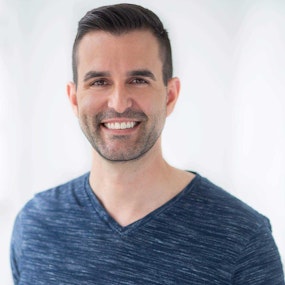
Andrew Murdoch
Founder
Andrew Murdoch spent the better part of his adult years working and serving as a scuba instructor on cruise ships, an industrial firefighter in the Canadian oil patch, freight train conductor, and Coast Guard Rescue Diver at a hovercraft base.
He believes the "normal" approaches to life are outdated and the best solutions require some out-of-the-box thinking. This line of thinking led Andrew to launch a full-service YouTube Marketing Agency built 100% with remote team members. Being a Digital Nomad means that no pandemic, political/civil unrest, or natural disaster will disrupt his lifestyle.




























